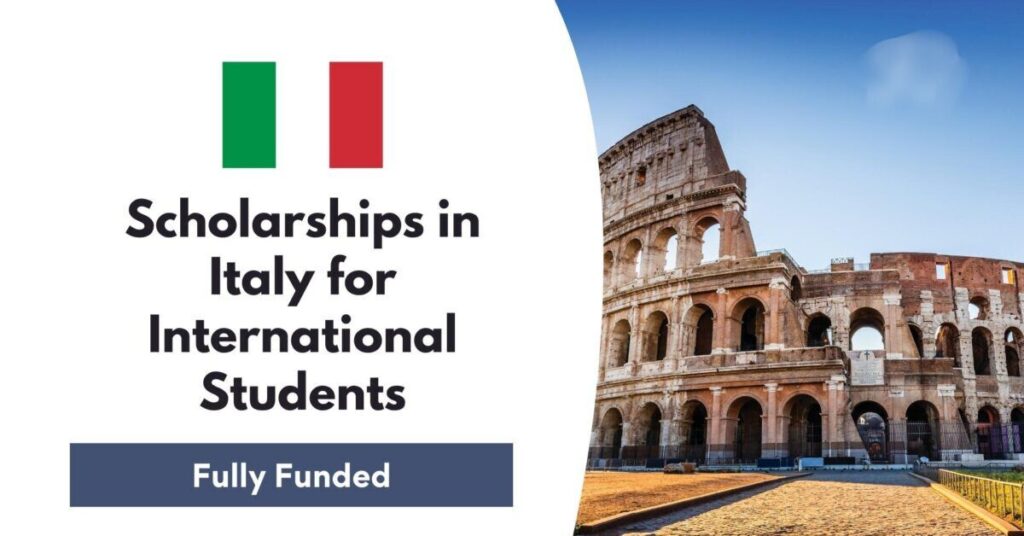
Italy, renowned for its rich history, cultural heritage, and world-class education system, is a dream destination for many international students. With its prestigious universities, innovative research opportunities, and vibrant student life, Italy offers an unparalleled academic experience. However, the cost of studying abroad can be a significant barrier for many students. Fortunately, Italy provides a wide range of fully funded scholarships for the academic year 2025-26, covering tuition fees, accommodation, living expenses, and even travel costs. This guide will walk you through the steps to secure a fully funded scholarship in Italy, ensuring you can pursue your academic dreams without financial stress.
1. Understand the Types of Fully Funded Scholarships Available
Before diving into the application process, it’s essential to understand the different types of fully funded scholarships available in Italy. These scholarships are typically offered by the Italian government, universities, and international organizations. Here are the main categories:
a) Italian Government Scholarships
The Italian Ministry of Foreign Affairs and International Cooperation (MAECI) offers scholarships to international students for undergraduate, postgraduate, and PhD programs. These scholarships cover tuition fees, health insurance, and provide a monthly stipend.
b) University-Specific Scholarships
Many Italian universities offer their own fully funded scholarships to attract talented international students. Examples include:
- Bocconi University Scholarships: Available for undergraduate and graduate students, covering full tuition and providing a stipend.
- Politecnico di Milano Merit-Based Scholarships: Offered to high-achieving students pursuing engineering, architecture, or design programs.
- University of Bologna Study Grants: Designed for international students enrolling in bachelor’s or master’s programs.
c) Erasmus+ Program
Funded by the European Union, the Erasmus+ program provides scholarships for students to study in Italy as part of an exchange program. It covers travel costs, tuition fees, and living expenses.
d) Regional Scholarships
Some Italian regions offer scholarships to international students studying at universities within their jurisdiction. These scholarships often include tuition waivers and living allowances.
e) Private and International Organization Scholarships
Organizations like the Fulbright Commission, DAAD, and Rotary International offer fully funded scholarships for students to study in Italy.
2. Research Eligibility Criteria
Each scholarship has specific eligibility criteria, which may include academic merit, financial need, nationality, and field of study. Here’s what to look for:
- Academic Requirements: Most scholarships require a strong academic record, such as a high GPA or equivalent.
- Language Proficiency: Depending on the program, you may need to prove proficiency in Italian or English through tests like IELTS, TOEFL, or CILS.
- Nationality: Some scholarships are restricted to students from specific countries or regions.
- Field of Study: Certain scholarships are only available for specific disciplines, such as STEM, arts, or social sciences.
Also see: UCL Gatsby Bridging Summer School 2025 in UK (Fully Funded)
3. Choose the Right University and Program
Italy is home to some of the world’s oldest and most prestigious universities, including the University of Bologna, Sapienza University of Rome, and the University of Padua. When selecting a university and program, consider the following:
- Program Relevance: Choose a program that aligns with your academic and career goals.
- Scholarship Availability: Check if the university offers fully funded scholarships for your chosen program.
- Language of Instruction: Ensure the program is taught in a language you are proficient in (Italian or English).
- University Rankings and Reputation: Consider the university’s global ranking and reputation in your field of study.
4. Prepare a Strong Application
A well-prepared application is key to securing a fully funded scholarship. Here’s how to make your application stand out:
a) Academic Transcripts and Certificates
Ensure your academic records are up-to-date and translated into Italian or English if required. Highlight any academic achievements or awards.
b) Statement of Purpose (SOP)
Your SOP should clearly articulate your academic goals, career aspirations, and reasons for choosing Italy and the specific program. Tailor your SOP to each scholarship and university.
c) Letters of Recommendation
Obtain strong letters of recommendation from professors or employers who can vouch for your academic abilities and character.
d) CV/Resume
Include your academic background, work experience, research projects, publications, and extracurricular activities.
e) Language Proficiency Proof
Submit valid test scores for Italian or English proficiency, depending on the program requirements.
f) Research Proposal (for PhD Applicants)
If applying for a PhD, prepare a detailed research proposal outlining your research objectives, methodology, and relevance to your field.
5. Apply for Scholarships Early
Scholarship deadlines vary, but most applications for the 2025-26 academic year will open in late 2024 or early 2025. Start preparing your application materials well in advance to avoid last-minute stress. Keep track of deadlines for each scholarship and submit your applications early.
6. Explore Alternative Funding Options
If you don’t secure a fully funded scholarship, consider other funding options to support your studies in Italy:
- Part-Time Work: International students in Italy can work part-time (up to 20 hours per week) to support themselves.
- Student Loans: Some banks and financial institutions offer loans to international students.
- Crowdfunding: Platforms like GoFundMe can help you raise funds for your education.
7. Tips for Success
- Network with Alumni: Reach out to former scholarship recipients or alumni of your chosen university for advice and insights.
- Attend Scholarship Workshops: Many universities and organizations host workshops to guide students through the scholarship application process.
- Stay Organized: Keep a checklist of required documents and deadlines for each scholarship.
- Proofread Your Application: Ensure your application is free of errors and professionally presented.
8. Top Scholarships to Consider for 2025-26
Here are some of the top fully funded scholarships in Italy for international students:
- Italian Government Scholarships (MAECI)
- Coverage: Tuition fees, health insurance, monthly stipend.
- Eligibility: Open to students from all countries.
- Bocconi University Scholarships
- Coverage: Full tuition waiver and stipend.
- Eligibility: High-achieving undergraduate and graduate students.
- Politecnico di Milano Merit-Based Scholarships
- Coverage: Tuition fees and living expenses.
- Eligibility: Students enrolling in engineering, architecture, or design programs.
- University of Bologna Study Grants
- Coverage: Tuition waiver and €11,000 grant.
- Eligibility: International students applying for bachelor’s or master’s programs.
- Erasmus+ Program
- Coverage: Tuition fees, travel costs, and living expenses.
- Eligibility: Students from EU and partner countries.
Also see: Study in Canada without IELTS 2025-26 – Fully Funded Canadian Scholarships
9. Final Thoughts
Securing a fully funded scholarship in Italy for the 2025-26 academic year requires careful planning, thorough research, and a strong application. By understanding the types of scholarships available, meeting eligibility criteria, and submitting a compelling application, you can turn your dream of studying in Italy into a reality. Start your journey today, and take the first step toward an enriching academic experience in one of the world’s most beautiful and culturally rich countries.
Good luck!
